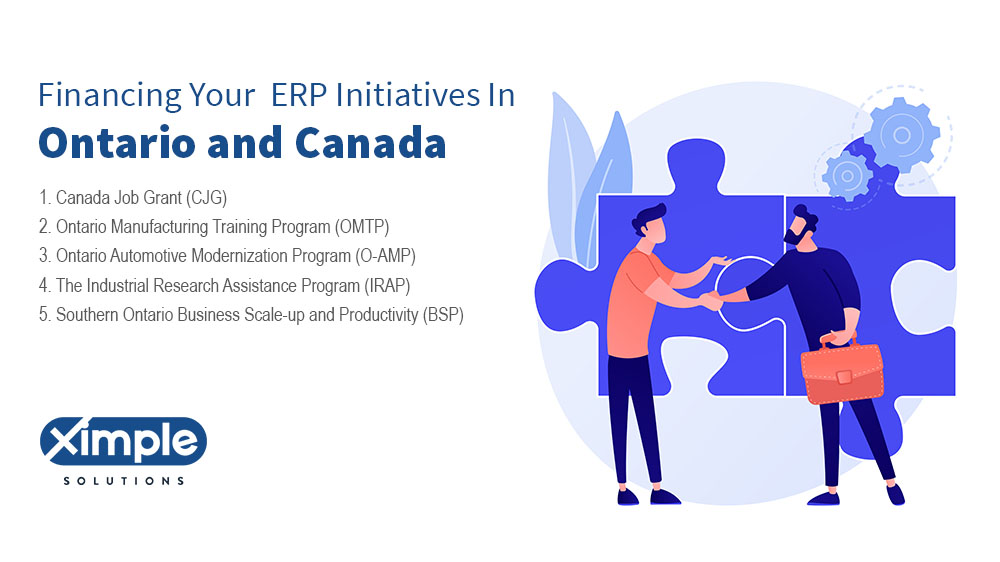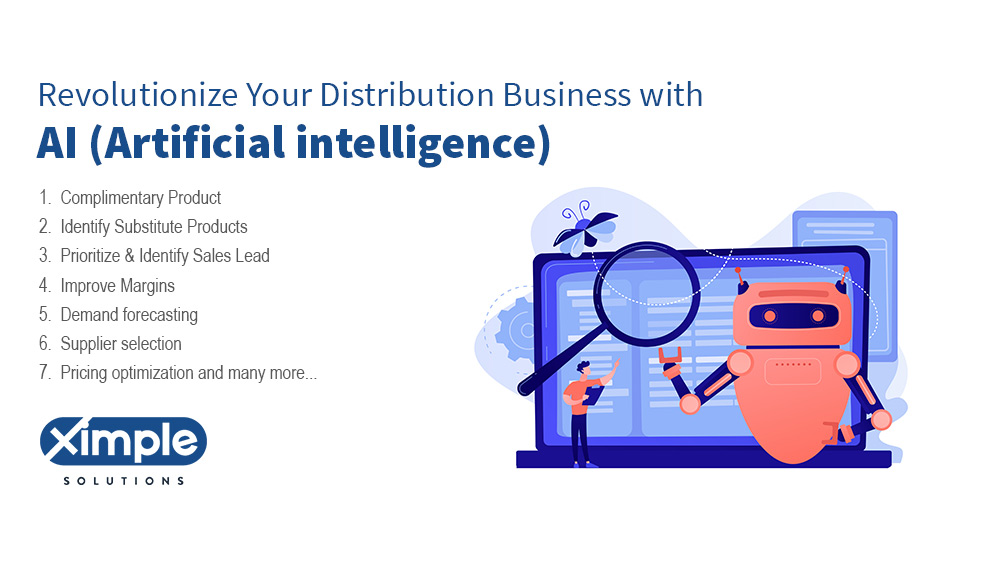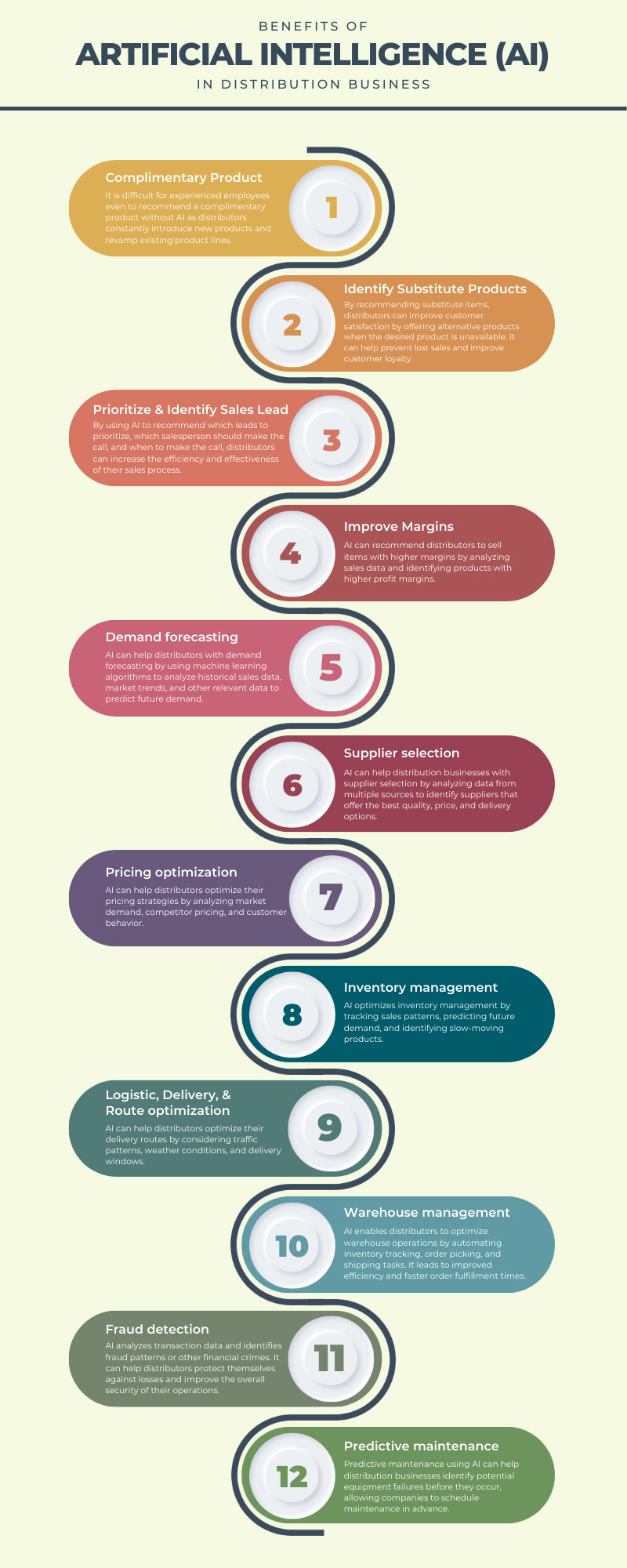Financing Your ERP and Accounting Software Initiatives In Ontario And Canada
No matter the industry, an ERP project can account for a significant portion of your technological investment. These projects are often resource-intensive and demand substantial effort to ensure success, but once implemented and operational, they can revolutionize your small or medium-sized business.
Despite the costs, investing in ERP is necessary to unleash its potential. Fortunately, businesses in Ontario and Canada have access to various funding options to facilitate the implementation of top-tier ERP solutions like Ximple ERP.

Here are excellent funding sources for your ERP implementation project:
- Canada Job Grant (CJG): Part of Canada’s Economic Action Plan, the CJG offers a grant covering 50-83% of training expenses, capped at $6,000 – $10,000 per trainee. The objective is to provide trainees with workforce training and skills development, allowing them to contribute productively to the economy.
- Ontario Manufacturing Training Program (OMTP): This grant serves a similar purpose but is restricted to 25-50% of costs, with a maximum of $100,000. The focus is on providing trainees with hands-on training and exposure to innovative software, equipment, and processes that will benefit your organization in the long run.
- Ontario Automotive Modernization Program (O-AMP) aims to help small and medium-sized automotive parts suppliers modernize their supply chains and enhance their competitiveness. O-AMP offers up to $150,000 to Ontario-based SMBs, covering up to 50% of eligible project expenses. Eligible projects include (but are not limited to) Enterprise Resource Planning (ERP) software, production tracking systems, and lean manufacturing best practice consulting.
- The Industrial Research Assistance Program (IRAP) provides various sub-programs to assist small and medium-sized enterprises (SMEs) in addressing internal innovation challenges. The Digital Technology Adoption Program offers financial support to cover labor and subcontractor expenses related to technical and business innovation projects, such as ERP software implementation. Funding available: Grants cover 80% of direct labor costs and 75% of subcontractor fees, up to a maximum of $100,000.
- Southern Ontario Business Scale-up and Productivity (BSP) The FedDev Business Scale-up and Productivity program supports businesses in southern Ontario adopting new technologies that enhance productivity and promote exports to global markets. Funding available: Interest-free repayable contributions covering up to 35% of eligible project expenses, ranging from $500,000 to $10 million per project.
Programs are designed to decrease training expenses for Ontario and Canadian businesses, encouraging more young people to work in key innovation areas. Utilize these resources to recruit fast learners who can be trained in ERP software, CRM, and other essential functions, including soft skills training, technical skills training, and business development.
Each program has unique requirements, but some standard features include:
• Coverage of costs related to training, such as learning materials, software, textbooks, etc.
• The option to train as many individuals as desired, provided they meet the eligibility criteria.
• The recoverable portion of training expenses may vary depending on your needs and business size.
Investing in human potential helps offset the expenses of implementing and managing critical software projects, enabling you to enhance adoption throughout your organization, reduce project risk, and increase the Return on Investment (ROI) for your ERP project.
*Many programs change regularly, so we advise users to visit the government website to check eligibility.
Posted on
Revolutionize Your Distribution Business with AI: Real-Life Success Stories and Benefits
This article highlights several real-life examples of how distribution businesses leverage cutting-edge technologies to gain a competitive edge and minimize risk. With real-world examples from industry leaders, this article is a must-read for anyone looking to stay ahead of the curve in the fast-evolving distribution world. So, to gain a competitive edge and future-proof your business, check out this informative and thought-provoking piece.
In today’s fast-paced and competitive business environment, distributors cannot afford to fall behind their competitors. Artificial intelligence has become a game-changing technology for the distribution industry, enabling businesses to streamline their operations, increase efficiency, and boost profitability. By leveraging AI technologies, distributors can make more informed decisions, identify growth opportunities, and gain a competitive edge in the marketplace.

With machine learning and natural language processing, AI can analyze vast amounts of data, detect patterns, and make unprecedentedly accurate predictions. Distributors can reduce costs, improve customer satisfaction, and drive revenue growth by implementing AI. The benefits of AI are clear, and businesses that fail to embrace this technology risk being left behind in the rapidly evolving distribution landscape. Let’s review how leading distribution businesses use AI to stay ahead of the competition.

Complimentary Product:
It is difficult for experienced employees even to recommend a complimentary product without AI as distributors constantly introduce new products and revamp existing product lines. It gets even more challenging if you carry thousands of products. AI can help distributors find complementary products by analyzing customer purchasing patterns and identifying products that are frequently purchased together. This is known as “product recommendation” or “product bundling. For example, if a customer frequently purchases a specific product, the AI algorithm might suggest complementary products, such as
- Electrical connectors and wires: If a customer purchases electrical connectors, the AI algorithm might suggest complementary products such as wires, cable ties, and conduit fittings.
- Lighting fixtures and bulbs: If a customer is purchasing lighting fixtures, the AI algorithm might suggest complementary products such as light bulbs, lamp shades, and dimmer switches.
- HVAC equipment and accessories: If a customer purchases HVAC equipment, the AI algorithm might suggest complementary products such as air filters, thermostats, and ducting.
- Power tools and accessories: If a customer purchases power tools, the AI algorithm might suggest complementary products such as blades, bits, and drill chucks.
Identify Substitute Products:
By recommending substitute items, distributors can improve customer satisfaction by offering alternative products when the desired product is unavailable. It can help prevent lost sales and improve customer loyalty. Additionally, AI can help distributors optimize inventory management by identifying substitute items that can be stocked as alternatives to high-demand products.
AI can suggest Distributors substitute items by analyzing product data and identifying products with similar features or capabilities.
- For example, suppose a customer is searching for a specific model of light bulb that is out of stock. In that case, the AI algorithm might suggest substituting items with similar wattage, color temperature, and bulb shape.
Prioritize & Identify Sales Lead:
By using AI to recommend which leads to prioritize, which salesperson should make the call, and when to make the call, distributors can increase the efficiency and effectiveness of their sales process. It improves conversion rates, reduces the time and resources required to close a sale, and drives revenue growth.
AI can suggest salespeople make cold calls to high-probability leads by analyzing customer data and identifying leads most likely to convert into sales.
Improve Margins:
AI can recommend distributors to sell items with higher margins by analyzing sales data and identifying products with higher profit margins. Distributors can use AI to suggest which products to sell to increase profitability and drive revenue growth. Additionally, AI can help distributors optimize inventory management by identifying high-margin products that can be stocked in larger quantities to maximize profitability.
Demand forecasting:
AI can help distributors with demand forecasting by using machine learning algorithms to analyze historical sales data, market trends, and other relevant data to predict future demand.
By leveraging AI for demand forecasting, distributors can optimize their inventory levels, reduce the risk of stockouts or overstocking, and improve their overall supply chain efficiency. Additionally, AI can help distributors improve customer service by ensuring that popular products are always available and available.
Supplier selection:
AI can help distribution businesses with supplier selection by analyzing data from multiple sources to identify suppliers that offer the best quality, price, and delivery options.
Distributors use AI for supplier selections to streamline their procurement process, reduce costs, and ensure they are working with the best suppliers for their needs. Additionally, AI can help companies to mitigate the risk of partnering with suppliers that may not meet their quality, price, or delivery requirements, improving their supply chain management’s overall efficiency and effectiveness.
Pricing optimization:
AI can help distributors optimize their pricing strategies by analyzing market demand, competitor pricing, and customer behavior.
AI pricing optimization improves distribution business profitability, reduces costs, and gains a competitive market edge. Additionally, AI can help companies to stay agile and responsive to changing market conditions, ensuring that they are always offering the best prices to their customers.
Inventory management:
AI optimizes inventory management by tracking sales patterns, predicting future demand, and identifying slow-moving products.
Inventory management leveraging AI improves order fulfillment rates, reduces carrying costs, and minimizes the risk of stockouts or overstocking for wholesale distributors. Additionally, AI can help enterprises to optimize their supply chain and logistics operations, lowering costs and improving customer satisfaction.
Logistic, delivery, and Route optimization:
AI can help distributors optimize their delivery routes by considering traffic patterns, weather conditions, and delivery windows. This can help reduce delivery times and improve customer satisfaction.
Warehouse management:
AI enables distributors to optimize warehouse operations by automating inventory tracking, order picking, and shipping tasks. It leads to improved efficiency and faster order fulfillment times.
Fraud detection:
AI analyzes transaction data and identifies fraud patterns or other financial crimes. It can help distributors protect themselves against losses and improve the overall security of their operations.
Predictive maintenance:
Predictive maintenance using AI can help distribution businesses identify potential equipment failures before they occur, allowing companies to schedule maintenance in advance and avoid unexpected downtime. It supports distributors in improving operational efficiency.
Energy management:
AI can help distribution businesses manage energy at their warehouses by analyzing energy usage, weather patterns, and other relevant factors to optimize energy consumption and reduce costs. AI for energy management for distribution businesses can reduce their energy consumption and costs, improve efficiency, and promote sustainable business practices.
Customer experience:
AI tracks customer behavior and preferences, allowing distributors to provide a more personalized experience. It can lead to higher customer satisfaction and loyalty.
Conclusion
The distribution industry embraces AI technology to streamline operations, increase efficiency, and boost profitability. AI can provide benefits such as identifying complementary and substitute products, improving the sales process, optimizing pricing strategies, managing inventory, optimizing delivery routes, automating warehouse operations, and detecting fraud. AI also helps predict equipment failures, reducing downtime and improving energy management. Furthermore, AI enables distributors to provide a personalized customer experience, increasing customer satisfaction and loyalty. Distributors not implementing AI risk being left behind in a rapidly evolving industry.